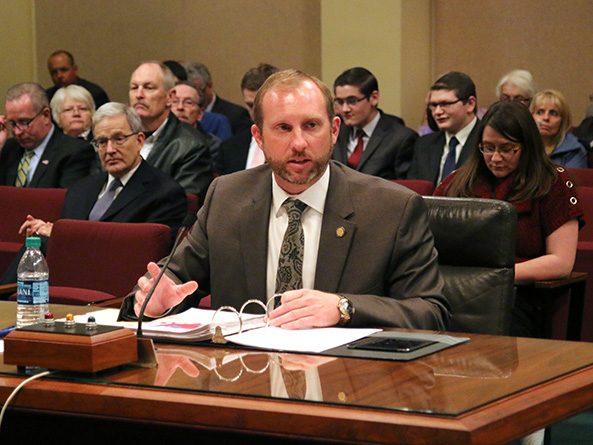Confidentiality sought for lethal injection drug providers
A bill that seeks confidentiality for certain records relating to the state’s lethal injection protocol was considered by the Government, Military and Veterans Affairs Committee Feb. 9.

Under LB661, introduced by Heartwell Sen. John Kuehn, records containing any information that reasonably would lead to the identity of any person or entity that manufactures, supplies, compounds or prescribes the substances, medical supplies or medical equipment used to perform a lethal injection would be confidential and exempt from disclosure under the state’s public records laws.
Kuehn said the bill would protect providers of drugs used in a lethal injection protocol from harassment and threats, while still making the identity of the drug and any lab analysis publicly available.
Harassment by death penalty opponents has resulted in the commercial unavailability in the U.S. of certain drugs used in lethal injection, Kuehn said, so a shield law regarding the identity of drug providers could increase the state’s chances of obtaining the necessary drugs.
Through the initiative process, 61 percent of Nebraska voters chose to reinstate the death penalty after it was repealed by the Legislature in 2015, he said — sending lawmakers a clear message.
“It is now the responsibility of elected officials and state agencies to act in accordance with the will of the people and address the functional problems with the death penalty,” Kuehn said.
Bob Evnen, a cofounder of Nebraskans for the Death Penalty, spoke in favor of the bill. He said objections to the measure on transparency grounds are really objections to the death penalty. That issue has been settled, he said, and now the state needs to facilitate the execution process.
“There is a long history of protecting the identity of those involved in death penalty protocols,” he said. “Nebraskans have spoken, and they expect the Legislature to act to enable the state to carry out capital punishment in the few cases where it is warranted.”
Scott Frakes, director of the state Department of Correctional Services, also testified in support. Nebraska currently shields the identities of members of an execution team and protects medical professionals from action against their licenses resulting from participation in an execution, he said.
“LB661 is a reasonable extension of [those] privacy protections,” Frakes said.
Alan Peterson, an attorney who was appointed to defend a death row inmate, spoke in opposition to the bill. The state’s comprehensive public records law was passed in 1979, he said, but its roots can be found in territorial law from the 1850s.
Given the serious nature of an execution, he said, the state has an additional obligation to act in a manner that is open to the public.
“Don’t sacrifice — along with the person that’s being killed — the transparency of state government,” Peterson said. “That’s really a sacrifice.”
Spike Eickholt, testifying on behalf of the ACLU of Nebraska, also opposed the bill, saying the state Department of Correctional Services in particular should not be allowed to operate without public scrutiny.
The department has experienced scandal and embarrassment in recent years, he said, from prison overcrowding to miscalculated sentences, escapes and a riot. The department also was involved in an unsuccessful attempt to purchase a drug to be used in the lethal injection protocol, he said, which turned out to be a “scam” that cost the state $54,000.
“This is an agency that the people of Nebraska are entitled to observe in public,” Eickholt said. “The people in this state deserve to know where their money goes.”
Mary Boschult of the League of Women Voters of Lincoln and Lancaster County agreed.
“If you’re acting on behalf of the people, the people have a right to know what you are doing and how you are doing it,” she said.
The committee took no immediate action on LB661.


